
|
[an error occurred while processing this directive]
The Corporate Accountability Project (CAP) has
published two papers on environmental and social performance of the
high-technology industry.
The first paper, The High Tech Sector and the Environment in the
New Millennium: Performance, Prescriptions, and Policy,
was authored by Jan Mazurek of the Novation Policy Group.
The second paper, A Study of the Performance of the Indian IT
Sector, was authored by Dr. Radha Gopalan of the Environmental
Management Center.
The CAP Project is a collaboration between Nautilus, the Natural
Heritage Institute
(NHI), and Human
Rights Advocates. It seeks to enhance the environmental and social
performance of US multinational corporations, in both their domestic
and overseas operations.
December 21, 2000
W. Alton Jones has provided generous support to the Nautilus Institute's Peace & Security and Energy programs, including the DPRK Wind Power project, the Nuclear Policy project, the Northeast Asia Peace & Security Network, and a new project on peaceful use of space.
Some 35 participants from international business, non-governmental organizations, academia, and government explored the legal, economic and political issues involved in extending home country liability to the overseas operations of US and UK multinational corporations. Drawing on the Program's work on developing an ethics-based approach to international investment rules, Zarsky analyzed the social and environmental impacts of foreign direct investment. The workshop was sponsored by the Energy and Environment Program of the UK-based Royal Institute of International Affairs.
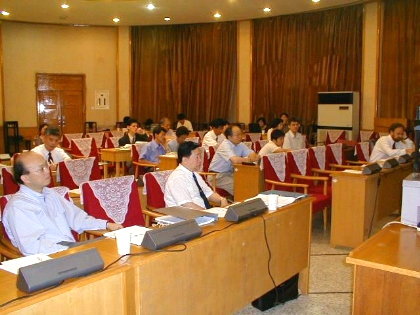
Nautilus held the East Asia Energy
Futures (EAEF) workshop in June with presentations on regional
energy security issues and methods for energy environmental security
analysis. Nautilus commissioned 12 papers from Chinese and other
regional authors on a variety of topics related to energy futures in
the Northeast Asian Region.
The first two papers, " 'Macro' Assumptions in the Future
Evolution of the Chinese Energy System" by Professor Zhou Fengqi and
"Modeling of Clean Coal Scenarios for China" by Dr. David Von Hippel,
have been posted on the EAEF web site. The
remaining papers will be posted by the end of January, 2001.
The Bulletin of Atomic Scientists in its Nov.-Dec. 2000 issue has published a review written by Wade Huntley, program director for Nautilus's Peace & Security Program, of Blowback: The Costs and Consequences of American Empire, by Chalmers Johnson.
The article describes how the Nautilus Institute's windmill project is helping to defuse tension on the Korean Peninsula by promoting cooperative engagement with the DPRK. The article was based on interviews conducted with Nautilus Executive Director Peter Hayes and Security Program Officer Timothy Savage, and includes commentary by Joseph Cirincione, director of the Non-Proliferation Project at the Carnegie Endowment for International Peace, and former National Security Council member Mitchell Reiss.
Other Panelists were Professor Kim Il-Chung (Dongguk University, South Korea), Dr. Hong Wuk Hee (Semin Research Institute, South Korea), Professor Shim Shang-Gyoo (Korea Institute of Science and Technology), Professor Zhu Tong (Peking University, China), and Dr. Shohei Yonemonto (Mitsubishi Kasei, coordinator).
The workshop will examine the prospects for enhancing regional cooperation in Northeast Asia through greater international coordination among space booster rocket providers and existing multinational consortia on space-based remote sensing, communications, and disaster response. The workshop, which will take place in early 2001, will include experts from countries with booster rocket and space-based commercial capacities, including the DPRK, ROK, China, Japan, and the United States.
Pegasus Project Completes Three Booster Voyages
The Pegasus completed three after-school voyages on November 29 and 30 and
December 5 with Berkeley Boosters from Rosa Parks Elementary School and Martin
Luther King Middle School in Berkeley. While aboard, the youth visited the
bowsprit, acted as lookout, sat on the "Royal Seat" at the bowsprit, and
took the helm. They listened to the Bay with their eyes closed, and
learned about tides, currents, vessels transiting the Bay, and the Berkeley
pier.
Pegasus crew included Captains Paul Kassatkin, Mark Caplin, and Peter
Hayes; and crew Marena Drlik, Hans Kristensen, Sandra Marquardt, Jim Gaebe,
Kathy Corliss, Khadija Pierce, Toni Weingarten, Christine Albertsen, Bill
Gunn, Paul Marbury.
 Meanwhile, a Los Angeles Times article published Sun., Dec. 3 described the aims of the Nautilus wind-power project. At a news briefing in Seoul following his visit, Rep. Hall stressed the need to address the DPRK's energy shortages to alleviate the North Korean famine. Hall said: "The idea of providing fuel to a country whose military remains a threat is a controversial one, and I am not proposing the wholesale delivery of oil and gas to Pyongyang. But it is past time to seriously consider projects like one I saw in Unhari Village, where the U.S.-based Nautilus Institute is working with North Korean scientists to harness wind power. "U.S.-designed wind turbines are now heating and lighting homes, purifying drinking water, and irrigating fields, and their success could be replicated in other communities. The added advantage of projects like this is that they offer a way for foreigners to work together with local people and to extend the ties that are now being built among engaged countries' diplomats." This was the first visit by a U.S. elected official to the site, where the Nautilus Institute is working with its North Korean counterparts to demonstrate the efficacy of renewable energy technology. Hall, founder of the Congressional Hunger Center, was making his sixth visit to the DPRK.
Margaret comes to us with an extensive background in office and business
operations. Prior to joining Nautilus, she was a paralegal and a legal
assistant in a private law office, a paralegal intern in a Federal public
defender's office, and an accounts receivable assistant.
Margaret's humor and humanizing influence on our office have been
appreciated since she joined our staff at the end of September.
the Future of U.S.-China Relations 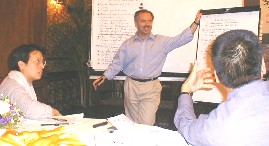
Hua Han, Wade Huntley, and Shieh Tsing Hsieh at the Beijing Workshop Nautilus Program Directors Lyuba Zarsky and Wade Huntley were in Beijing Nov. 14-17 with 17 other thinkers from the U.S. and China to discuss "What Road Ahead? Scenarios for the Future of U.S. and China Relations." Facilitated by Alain Wouters of the Global Business Network-Europe, participants collaborated in developing four narrative scenarios in which a variety of economic and political factors brought the U.S. and China closer together -- or toward continued distrust and misunderstanding. Together, the four scenarios highlight challenges the two countries face in maintaining a constructive relationship over the next ten years. Nautilus is producing a U.S.-China Scenarios Report, which will be available on our Web site by the end of the year. The scenarios workshop was co-sponsored by Fudan University's Center for American Studies (CAS), Tsinghua University's China Energy and Environment Technology Center, and The South-North Institute for Sustainable Development (SNISD) of Beijing. The workshop was supported by grants from the Ford Foundation and the Rockefeller Brothers Fund.
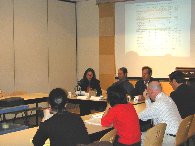
Jane Wales, Jim Williams, and Peter Hayes speak at the World Affairs Council Nautilus staff held a half-day seminar at the World Affairs Council in San Francisco on Nov. 16 to discuss the Institute's work in North Korea and its relation to regional energy and security issues. Nautilus Institute Executive Director Peter Hayes, Senior Associate Jim Williams, Security Program Officer for Northeast Asia Timothy Savage, Research Associate Chris Greacen and Energy Researcher Masami Nakata discussed their work. World Affairs Council President Jane Wales acted as moderator, and shared her experiences on the U.S. National Security Council during the 1993-1994 North Korean nuclear crisis. This seminar was sponsored by a grant from the Korea Foundation. A portion of the seminar will be broadcast by KQED-FM in the San Francisco Bay Area on January 22, 2001, and subsequently by National Public Radio stations nationwide.
The project is directed by Dr. Gregory F. Treverton, Senior Fellow at the Council, while the Task Force is co-chaired by Michael Parks, former editor and executive vice president of the Los Angeles Times, and Spencer Kim, Chairman of CBOL corporation. For more information on the project, please contact Raelyn Campbell, Program Associate for Asian Studies at the Pacific Council, at rcampbel@usc.edu.
The Nautilus Institute has released the
latest paper in the Missile Defense
Initiative Special Report series. The series of papers is a product
of the collaborative workshop, "
East Asian Regional Security Futures: Theater Missile Defense
Implications." The workshop was held on June 24-25 and was co-sponsored
by the Nautilus Institute and the United Nations University.
The fifth paper in this series, US Missile Defense
Programs, is provided by
Michael O'Hanlon,
Senior Fellow, Foreign Policy Studies at The Brookings Institution in
Washington, DC. All released papers are available on the conference Web site.
Additional papers by Japanese, US, and Chinese participants will become
available over the coming weeks.
The Nautilus Institute will hold a half-day seminar on "Solving North Korea's Regional Energy and Security Issues: A Step toward Rapprochement?" hosted by the World Affairs Council of Northern California. Nautilus staff and associates will present their work on North Korean energy and its relations to the ongoing efforts at rapprochement on the Korean Peninsula. The presentations will include slides of the Nautilus Institute's groundbreaking work to build windmills in North Korea. The seminar will be held from 9:00 am to 12:00 pm on Thursday, November 16 at the World Affairs Council, 312 Sutter St., Suite 200, San Francisco, CA. Admission is free, but reservations are required. Please call 415-293-4600 for reservations. This event is sponsored by a grant from the Korea Foundation. Ê Peter Hayes Interviewed on Australia Radio's "Asia Pacific" Program On the occassion of Australia Foreign Minister Alexander Downer's visit to North Korea, the Australian Broadcasting Corporation's Asia Pacific radio program carried an interview with Nautilus Executive Director Peter Hayes. In the interview, Peter told radio show host Anita Barraud about his most recent visit to Unhari village on North Korea's west coast.
The Nautilus Institute received additional coverage of the recent visit to Unhari village in a New York Times article entitled, "The Strange World of North Korea." Ê

Drawing on recent data gathered in the third mission to the DPRK to Unhari Village, Nautilus Senior Associates Chris Greacen (in photo) and Jim Williams and Executive Director Peter Hayes presented an overview to students and faculty on the interrelationships between nuclear geopolitics, energy economy, and rural energy and famine in the DPRK at the November 1, 2000 Colloquium of the Energy and Resources Group (ERG) at the University of California at Berkeley.
Over the three-year term of the grant, the Institute's Peace and Security Program will utilize a scenario-building methodology to identify issues that affect the future role of nuclear weapons in Asian security. The project will also create a community of policy-makers, specialists and scholars on these issues, to encourage development of greater common knowledge, consensus on long-term values, and fresh approaches to enduring problems.
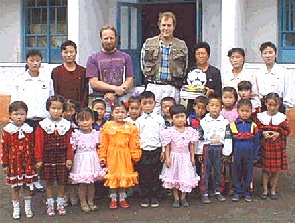
At right, Peter Hayes (in jacket) and David Von Hippel (purple shirt) are posing with teachers and children from Unhari Kindergarten. On Mission 3, which ran from September 19 through October 3, the team repaired wind turbines, provided training on their maintenance, and installed a Southern Cross water-pumping windmill to provide drinking water to Unhari village -- the first such unit in the DPRK.
In response to a question about how North Koreans view the external contact between the DPRK and the rest of the world, especially the United States, Peter said, "Decisions in a pyramidal society like this are so centralized, so political and so personal, that it is hard for Americans to understand that kind of pressure. Peter also said, "Many people are confused. They don't know what the new edicts from the top mean. Those at the top might not even know. They are striking out in a completely new direction, and they are going to have to make it up as they go along."
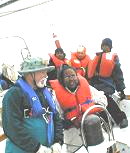 The San Francisco-based Hut Foundation has awarded the Pegasus Project a grant to support taking youth-at-risk and school children onto San Francisco Bay.
The funds will be used to support both during- and after-school voyages in the first half of 2001 and overnight voyages during summer 2001.
New Missile Defense Paper Issued The Nautilus Institute Missile Defense Initiative began releasing of a series of papers on the strategic implications of missile defenses in East Asia and globally. The papers are being authored by the participants in the recent Nautilus-sponsored workshop, "East Asian Regional Security Futures: Theater Missile Defense Implications", co-sponsored by the Nautilus Institute and the United Nations University and held in Tokyo, Japan, June 24-25.The third paper in this series, TMD and Northeast Asian Security , is provided by GU Guoliang, Deputy Director of the Institute of American Studies at the Chinese Academy of Social Sciences in Beijing, China. Additional papers by Japanese, US and Chinese participants will become available over the coming weeks. You can view all the papers that have been posted from the workshop at this web site. Papers will be added as they become available, and distributed through two Nautilus email lists: the Northeast Asia Peace and Security Network (NAPSNet) and the Nuclear Policy Project Weekly Flash. If you are not currently receiving one of these reports, you can subscribe to one or both of these free services.
Meanwhile, in the New York Times, an article by Tokyo Bureau Chief Howard French, "Ripples of Albright Visit Felt By American Allies in Area" cites Dr. Hayes. French writes that despite all of the potential surface tension between Washington and its regional allies, many experts said that growing collaboration, not rivalry, is increasingly likely as North Korea engages with other countries: "North Korea cannot go forward with out major structural adjustment, and they cannot achieve that adjustment without major resources," said Peter Hayes, co-executive director of the Nautilus Institute, a non-governmental aid organization active in North Korea. "It follows that the only place these resources can come from is Japan. Japan cannot deal directly with Pyongyang, because of Japanese mistrust of all things Korean, and especially North Korean, so there must be an intermediary, the World Bank. "But the World Bank cannot do anything unless Washington takes them off of the terrorist list, and that is what brings all the present focus back to Washington."
Energy Infrastructure Investment in DPRK
Nautilus Executive Director Dr. Peter Hayes presented the needs of the DPRK for energy infrastructure investment at a conference held at Stanford University on October 10.
The Conference, "New Challenges in Inter-Korean Economic Cooperation and Integration", was co-sponsored by Stanford's Asia/Pacific Reseach Center and the Kyung Hee University in
Seoul.
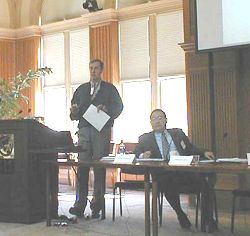
The Nautilus Institute Missile Defense Initiative began releasing
of a series of papers on the strategic implications of missile defenses in
East Asia and globally. The papers are being authored by the participants
in the recent Nautilus-sponsored workshop, "East Asian Regional Security
Futures: Theater Missile Defense Implications", co-sponsored by the
Nautilus Institute and the United Nations University and held in Tokyo, Japan, June
24-25.
The second paper in this series, TMD and Northeast Asian
Security , is provided by Shinichi OGAWA, Senior
Research Fellow
and Deputy Director of the Second Research Department, the National
Institute for Defense Studies (NIDS), Japan. Additional papers by
Japanese, US and Chinese participants will become available over the coming
weeks.
You can view all the papers that have been posted from the workshop at this
web site. Papers will be added as they become available, and distributed
through two Nautilus email lists: the Northeast Asia Peace
and Security Network (NAPSNet) and the Nuclear Policy Project
Weekly "Flash." If you are not currently receiving one of these
reports, you can subscribe to one or
both of these free services.
The Nautilus Institute's experiences in its latest wind-power mission to North Korea illustrate why high-level diplomatic meetings with the U.S., unimaginable just a year ago, are now possible.
That point is made by Executive Director Dr. Peter Hayes in an editorial column in the Oct. 16 San Francisco Chronicle.
Clark noted that Peter has just returned from North Korea where the Nautilus Institute has a demonstration renewable energy project. Peter
said, "The word is out in Onchon County that the Americans are in town
and doing good work. This is in great contrast to the historical perception of North Koreans that Americans are wolves on the hunt and that North Koreans are the prey."
Peter also told Clark that North Koreans are seeking training in many areas, but this won't be available until major institutions, like the
World Bank, are involved, and that, in turn, won't happen until the United States removes the DPRK from its list of terrorist-sponsoring states.
News and analysis of Jo Myong Rok's visit to the US:
In a recently released "consensus statement," scientists from North America and Asia said transport of pollution across the Pacific Ocean poses risks to the environment and human health and livelihood.
The statement was issued by participants in the First International Conference on Trans-Pacific Transport of Atmospheric Contaminants, initiated by the Nautilus Institute and co-chaired by the U.S. Environmental Protection Agency (EPA).
The conference, held in Seattle, WA July 27-29, 2000, included scientists from the U.S., Canada, China, Japan, Russia, and South Korea. It was spearheaded by Dr. Ken Wilkening, who recently left Nautilus for the University of Northern British Columbia. The conference is a first step in defining, measuring, and tackling the trans-Pacific pollution problem. It has been covered recently in the San Francisco Chronicle and in the Oct. 6 Science magazine.
On October 3-5, 2000, Sandy Buffett, Program Officer for the Globalization & Governance Program, attended the "Experts Meeting on the Global Environment 2000" in Tokyo Japan, hosted by Global Environment Action (GEA) .
Sandy was among 20 invited guests from international research institutions and NGOs discussing global environmental priorities for the 21st century including climate change, the Clean Development Mechanism (CDM) and the promotion of renewable energy, and the governance of international private investment and trade to promote sustainable development.
Peter Hayes speaks at Northeast Asian
Nautilus Institute Executive Director Peter Hayes spoke at the Kyobo Foundation's workshop on
regional environmental issues in Northeast Asia. He presented the
Institute's work on Northeast Asian environmental conflicts and
cooperation, including acid rain, energy security, and energy-related
marine environmental impacts. He also updated the participants on the
just-concluded Nautilus mission to the DPRK.
Peter repeated what he had told the villagers of Unhari after a toast was
raised to the successful construction of the DPRK's first water-pumping
windmill a few days earlier in the DPRK.
He said, "Why have we come behind the DMZ, to a place so far away from our homes and families? Why work here in the DPRK when there are so many places on the planet that need renewable energy?"
"All the members of the team believe that peace is not merely the absence
of war," he said.
"Rather," he declared, "peace is made brick by brick, person by person, windmill by windmill. That is why we came two years ago. That is why we are here today. That is why we will come back."
While in Seoul, Peter and Nautilus Peace and Security Program Officer Tim
Savage met with Ambassador Kim Ha-joong, the Senior Secretary to the ROK
President for Foreign Policy and National Security. They also briefed US
Ambassador Stephen Bosworth on their mission to the DPRK.
A five-person team from the Nautilus Institute has successfully completed the third mission of the US-DPRK Wind Power Village Humanitarian Energy Project. The mission followed up on two previous trips to North Korea in May and September of 1998. The team also transferred a water purification unit for later installation at a suitable humanitarian site. The unit, manufactured by Water Health International of Berkeley, Cal., uses ultraviolet light to kill pathogens in drinking water.
At the conclusion of the visit, Nautilus and its DPRK partner pledged to continue working together. A fourth mission is tentatively planned for next year. Go to the full report...
The Nautilus Institute has moved to a new office. We are now at 125 University Avenue, Second Floor, Berkeley, CA 94710-1616. Our main numbers remain 510-204-9296 (phone) and 510-204-9298 (fax). Each staff member now has a direct phone number and voicemail. Our email and Web addresses are unchanged.
We were without phone service or Internet access for a few days surrounding the move. We apologize for any inconvenience this has caused. Our new location is on the Berkeley Marina, about one-half mile west of our current office. We have outgrown our current office; the new building is expected to meet our needs for many years to come. We look forward to welcoming visitors at our new site! Go to more about the move ...
The Nautilus Institute Missile Defense Initiative began releasing of a series of papers on the strategic implications of missile defenses in East Asia and globally. The papers are being authored by the participants in the recent Nautilus-sponsored workshop, "East Asian Regional Security Futures: Theater Missile Defense Implications", co-sponsored by the Nautilus Institute and the United Nations University and held in Tokyo, Japan, June 24-25.
The first paper, TMD and US-China-Japan Cooperation, is provided by WANG Qun, Director, Department of Arms Control and Disarmament, PRC Ministry of Foreign Affairs. Additional papers by Japanese, US and Chinese participants will become available over the coming weeks.
All papers from the workshop will be posted at this web site, as they become available, and distributed through two Nautilus email lists: the Northeast Asia Peace and Security Network (NAPSNet) and the Nuclear Policy Project Weekly "Flash." If you are not currently receiving one of these reports, you can subscribe to one or both of these free services.
The Missile Defense Initiative is a current focus of the Nautilus Institute's ongoing Nuclear Policy Project, and is supported by grants from the Ford Foundation, the MacArthur Foundation, the Ploughshares Fund, and the Japan-United States Friendship Commission.
Go to the TMD Conference web site...
Nautilus Welcomes Leif Brottem
Prior to joining Nautilus, Leif worked for the Governor of Alaska on forestry, oil, and environmental quality issues. Leif also has interned at sustainability organizations in Alaska and Washington state.
Leif has a BA in Political Science from Carleton College, and studied European Environmental Policy at the University of Limburg, The Netherlands. In high school, he was an exchange student in Japan.
Leif joins Sandy Buffett, another recent addition to the Globalization and Governance team.
Go to Leif's page ...
Nautilus Team Enters DPRK to Build Water-Lifting Windmill
BEIJING -- A five-person expert mission of Nautilus staff and associates flew from Beijing to Pyongyang today. The group is heading for the village of Unhari in Onch'on Province on the coast west of Pyongyang to conduct maintenance on seven wind electric turbines constructed in 1998.
The team will also construct a water-pumping windmill in Unhari for irrigation of food crops.
Nautilus is also providing an ultraviolet light water purification unit for use in a DPRK hospital. The team will demonstrate the use of this unit, supplied by Water Health International.
"We are looking forward to working closely with DPRK technicians on the ground in the DPRK," said Dr. Peter Hayes, Nautilus Executive Director and head of the team. "This mission has been two years in the making, and the time is ripe for US-DPRK non-governmental cooperation to forge ahead in the aftermath of the ROK-DPRK Presidential Summit."
In an interview by National Public Radio's Ted Clark on Sept. 12, Peter Hayes, Executive Director of Nautilus Institute, commented about statements made by Republic of (South) Korea President Kim Dae Jung on the willingness of the Democratic People's Republic of (North) Korea to allow US troops to remain in South Korea. Hayes noted that the first hints of this realist view were expressed by DPRK leaders as early as 1978, and that explicit statements to this effect have been made by senior DPRK policymakers in private since the early 1990s.
With regard to Kim Dae Jung's statement that the international community should take Kim Jong Il's reported offer to trade in his missile program in return for access to space, Hayes said responding positively to the DPRK could lead to a global treaty curbing missile proliferation.
"They [the North Koreans] would get some form of facilitated access to peaceful uses of space in return for commitment to not proliferate missiles or booster rockets," he said.
"In that respect," he added, "it's very similar to the structure of Atoms for Peace in the Non-Proliferation Treaty, where countries pledged themselves to forego the putative benefits of the nuclear fuel cycle in return for non-proliferation of nuclear weapons."
Hear the report in RealAudio 14.4K or 28.8K
Lyuba Zarsky To Attend Roundtable on
Lyuby Zarsky, Director of the Nautilus Institute's Globalization and
Governance Program, will participate in a roundtable to help finalize the first Asian Environment Outlook (AEO) report.
The roundtable will bring together 25 experts September 13-15 at the Rocky Mountain Institute in Aspen, Colorado. Based on her prior work and contribution to the AEO, Ms. Zarsky will chair a session on Environment and Civil Society.
Lyuba Zarsky's Paper Published in New Book on Global Norms
A paper by Lyuba Zarsky has been published in a new
book,
Commitment and Compliance: The Role of Non-Binding Norms in the
International Legal System (Oxford University Press, 2000).
Edited by Dinah Shelton, the book is the result of a three-year
study project of the American
Society of International Law and was supported by the National Science Foundation and
the Ford Foundation.
August 25, 2000
Nuclear Policy Project Launches New TMD Web Site
The Nautilus Institute today launched a new web site detailing the "East Asian Regional Security Futures: Theater Missile Defense Implications" workshop co-sponsored by the Nautilus Institute and the United Nations University and held in Tokyo, Japan, June 24-25.
The meeting brought together a small group of specialists for an open exchange of views on the implications of TMD development and deployment. Topics included diplomatic, military and technical dimensions of current TMD proposals, and the relationship of TMD to U.S. national missile defense (NMD) proposals.
The workshop culminates the first phase of the Missile Defense Initiative, a project examining the role of TMD in the long-term evolution of East Asian regional security. The Missile Defense Initiative is a current focus of the Nautilus Institute's ongoing Nuclear Policy Project, and is supported by grants from the Ford Foundation, the MacArthur Foundation, the Ploughshares Fund, and the Japan-United States Friendship Commission.
Go to the TMD Conference web site...
Sierra Club and Northern California Grantmakers
Sierra Club and the Sierra Club Foundation Youth in Wilderness program have awarded a grant to support the Pegasus Project's summer program.
The Pegasus Project has also been supported this year by the Northern California Grantmakers Association summer youth grants program.
Nautilus Paper Published in Visionary New Study
A paper by Nautilus Program Director Lyuba Zarsky has been published in a new book exploring an environmentally sound growth trajectory in Asia.
The paper is co-authored by Simon Tay of the National University of Singapore, a member of the Singapore Parliament. The book was
produced for the Framing the Issues Project of the US-Asia Environmental
Partnership. It can be ordered from Greenleaf Publishing.
Sandy Buffett Joins Nautilus Program Staff
Nautilus Institute welcomes Sandy Buffett as the new Globalization and Governance Program Officer.
Prior to joining Nautilus, Sandy served as project coordinator for the Quantum Leap project, a joint project of the National Wildlife Federation and Friends of the Earth. Her biography is detailed on her Web page.
First Trans-Pacific Air Pollution Conference Draws 100 Experts
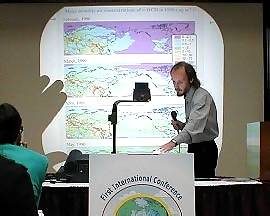
Alexey Gusev from Russia presents his modeling work at the Trans-Pacific Pollution conference. (Click image for larger version.) The largely scientific three-day conference drafted a consensus statement, "Long-Range Atmospheric Transport and Effects of Contaminants in the North Pacific Region: Knowledge, Concerns & Research Needs." The final statement, along with other conference materials, will soon be available on the Nautilus Web site. The conference was organized by the Nautilus Institute in conjunction with the U.S. Environmental Protection Agency. Other sponsors were the California Air Resources Board, Environment Canada, the Department of Indian and Northern Affairs of Canada, the U.S. Department of Energy, the U.S. National Oceanic and Atmospheric Administration, and the U.S. National Park Service. The event was coordinated by Nautilus Program Officer Ken Wilkening, with support from Special Projects Coordinator Kristin Burgess. Peter Hayes Speaks at Economic Cooperation Conference
Nautilus Executive Director Peter Hayes delivered a paper on economic cooperation in Northeast Asia, co-authored with Energy Researcher Masami Nakata and
Associate David Von Hippel, at the EWC-KDI annual conference at the East-West Center in Honolulu August 1 in Honolulu.
The authors analyzed the market and governmental sources of increased energy security in the region. They argued that collaborative regional institutions to increase immediate and tangible energy cooperation were the most effective way to bring untrammelled market-generated energy insecurity under control on the one hand, and to curtail and avoid the political and bureaucratic excesses of large-scale and state-subsidized regional energy projects on the other.
Zekos Family Thanks Pegasus Crew and Volunteers
Chris Zekos and his mother Marta Zekos held a barbecue at their home in
Richmond on August 6 to thank crew and volunteers of the Pegasus Project for their support in funding the first annual Pegasus-Sea Education Association award. The award enables Chris to attend the summer 2000 Science at Sea program run by the Sea Education Association (SEA) in Woods Hole, Massachusetts.
Chris presented Pegasus crew with mounted photographs he
took underway aboard the Pegasus, and Captain Bill Proctor responded on behalf of the crew by presenting Chris with a bearing compass for use on the SEA tall
ship.
Nautilus Awarded Ford Foundation Grant for Developing Personalized Information Services
The Ford Foundation awarded the Nautilus Institute a $71,000 grant to help fund the development of technology that delivers personalized information to the subscribers of its news services.
Ford Foundation has also awarded $9,000 to the Peace and Security Program to help fund its Missile Defense Initiative. This Initiative is assessing the long-term implications of theater missile defense (TMD) and national missile defense (NMD) deployments for security relationships in East Asia and globally.
Under this initiative, the Nautilus Institute, in collaboration with the United Nations University, recently convened a collaborative workshop, "East Asian Regional Security Futures: Theater Missile Defense Implications." The workshop, held June 24-25 in Tokyo, Japan, brought together 20 specialists from China, Japan and the United States for dialogue and discussion aimed at clarifying mutual understandings of the issues and exploring constructive resolutions of conflicting positions.
Indonesian Human Rights Activist Visits Nautilus
Kids participating in the Nautilus Institute's Pegasus Project feel "on top of the world," according to a feature story in the San Francisco
Chronicle July 7, 2000.
Chronicle reporter Benjamin Pimentel joined students from Rosa Parks
Elementary School on a sail aboard the Institute's 51-foot wooden
sailing vessel.
The story also covered a similar program aboard another vessel, the
Nehemiah, with Richmond High School students.
Go to the Pegasus Project...
Robert Brown joins
security program team
Rob coordinates the Institute's South Asia Nuclear
Dialogue and assists with production of the Northeast Asia Peace
and Security Daily Report, as well as with
the Nuclear Policy Project.
Rob has degrees in Political Science and International Affairs.
Go to Robert Brown's page...
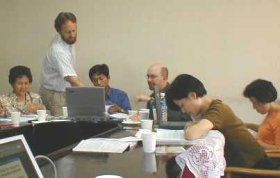
The Nautilus Institute held two energy workshops in Beijing June 14-18 with cosponsor US/China Energy and Environment Technology Center at Tsinghua University.
The first workshop, "Regional collaboration for Energy Futures and Energy Security in China and Northeast Asia," drew researchers from all countries in the region, plus Nautilus staff and advisors. Participants presented the current situations and future plans for energy development and energy security in their respective countries.
The second workshop, "Regional Collaboration for Energy Futures and Energy Security Analysis: Analytical Methods Training Workshop," provided training in the LEAP (Long-range Energy Alternative Planning System) energy modeling software. Nautilus Senior Associate David von Hippel conducted the training.
The workshops were organized by Nautilus Staff Researcher Masami Nakata with support from Special Projects Kristin Burgess. They were hosted by Dr. Wang Yangjia of the US/China Energy and Environment Technology Center at Tsinghua University.
Go to the Energy Program...
Following the successful inter-Korean summit, the real work of rehabilitating the DPRK still lies ahead, write Nautilus Executive Director Peter Hayes and Security Program Officer Tim Savage in a June 28 essay in the San Francisco Chronicle.
"The summit was all about mutual recognition and the politics of legitimacy," they write. "In contrast, the post-summit engagement will be all about economics, specifically, what the South is willing to pay to help the North survive and recover from its rock-bottom economy."
In particular, they argue that the problem of the DPRK's power shortage will require a holistic solution. They call on the US to remove the DPRK from the list of terrorist-sponsoring nations to allow the World Bank to contribute much-needed development funds.
Go to DPRK Renewable Energy Project ...

Theatre Missile Defense Workshop Concludes in Tokyo
A Nautilus Institute-sponsored workshop, "East Asian Regional Security Futures: Theater Missile Defense Implications," concluded June 25, ending three days of fruitful dialog.
The event convened June 23 with an evening dinner reception at the President Hotel in Tokyo, Japan. The purpose of the meeting, jointly sponsored with The United Nations University, was to increase communication and knowledge of current theater missile defense (TMD) proposals among specialists from China, Japan, and the United States. The substantive sessions of the workshop were held June 24-25 at The United Nations University campus in Tokyo.
The workshop brought together participants under an agenda structured to foster open dialog and discussion on the implications of TMD development and deployment. Topics included diplomatic, military and technical dimensions of current TMD proposals, and the relationship of TMD to U.S. national missile defense (NMD) proposals. The goals of the meeting were to reduce misperceptions and clarify mutual understandings of the issues, and to seek constructive resolutions of conflicting positions.
The workshop culminates the first phase of the Missile Defense Initiative, a project examining the role of TMD in the long-term evolution of East Asian regional security. The Missile Defense Initiative is a current focus of the Nautilus Institute's ongoing Nuclear Policy Project, and is supported by grants from the Ford Foundation, the MacArthur Foundation, the Ploughshares Fund, and the Japan-United States Friendship Commission.
Go to the Nuclear Policy Project...
In an article in The Korea Herald, Tim Savage commends the two Koreas' momentous step forward in resolving their mutual problems, and lays out some of the obstacles that they must overcome before true reconciliation can take place.
Go to the Security Program...
|
||
|
|
|||